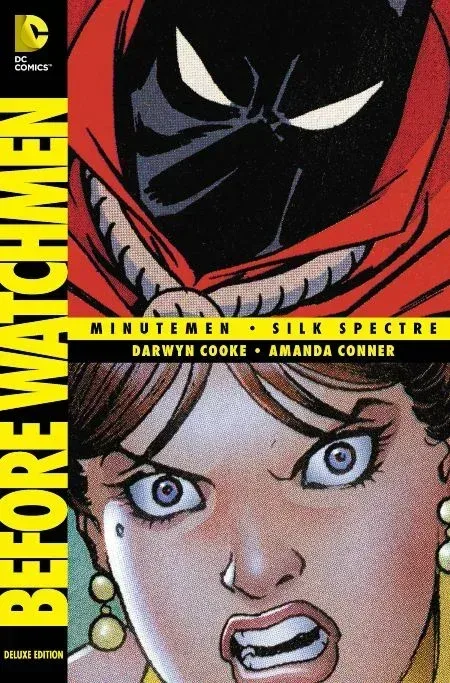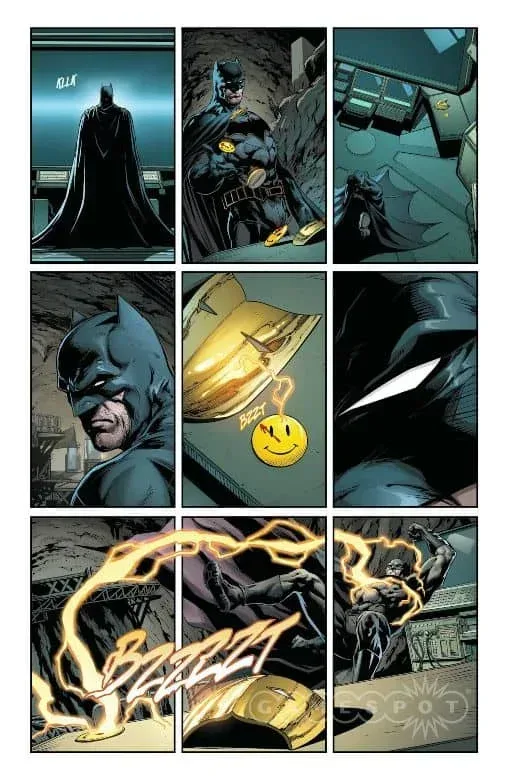
Along with Superman, DC’s most famous asset is certainly Batman, Gotham’s Dark Knight. On the other hand, DC’s best-ever story is Alan Moore’s Watchmen, a gritty superhero story about the twilight of superheroism in Cold War America. Now, one might that DC would certainly want to combine its most famous asset with its best-ever story, right? Well, that is exactly what I am going to be talking about in today’s article, as you’re going to find out whether Batman appeared in Watchmen.
Since Watchmen wasn’t really part of the DC Multiverse until 2017, Batman does not appear in Alan Moore’s comic book as it was set in a completely different universe back when it came out in 1986.
In today’s article, you are going to find out several things. The main topic will be Batman’s appearance – or the lack of one – in Moore’s Watchmen universe, but I will also talk about whether there truly are any superheroes in the story at all. I am also going to tell you a bit about the Before Watchmen prequel series, so relax and enjoy the article!
Are there any superheroes in Watchmen?
The definition of a superhero is rather fluid and you’ll find several different series about what constitutes a superhero. Some demand superhuman powers, some accept magic or genetic mutations, while others simply state that anyone who fights for the right (i.e., heroic) values in fiction can be considered a superhero. Personally, I am leaning towards the latter theory and my answer here will be in accordance with my views on the matter.
If you look at the character roster of Moore’s Watchmen, there is really only one superhuman character – Doctor Manhattan. And while Doctor Manhattan was a good guy at the beginning, when we see him in the graphic novel, he could hardly be described as a hero. He has come to terms with his godly side and has alienated himself from humanity, thus becoming a neutral character at best.
All the others – Rorschach, Nite Owl II, Silk Spectre, Ozymandias, and even the murdered Comedian – are just regular folks that wear costumes, fight crime, and are good fighters or, in Ozymandias’ case, also quite intelligent. They have no inherent superpowers so when a newcomer reads this comic book, he might fight it strange to see them labeled as heroes, as Moore’s depiction of them is rather unconventional.
But, there is absolutely no doubt that all of them are superheroes, although they are quite unorthodox, that I have to admit. When we see these characters in Watchmen, they are a bit different than before, more cynical and dark, but they still uphold the values they promised to defend, even if they have different ways of approaching them: Rorschach with his moral absolutism, Ozymandias with his consequentialism, Doctor Manhattan with his neutrality, and Nite Owl II and Slik Spectre with their rationalism and somewhat shattered humanism.
They are strange, they are dark, and most of them could be better described as antiheroes than heroes, but there is absolutely no doubt that Watchmen does have its superheroes and with this, I can conclude this section. Now, let us see how Batman ties into this.
Is Batman in Watchmen?
To be loud, clear, and brief – no, he is not. Now, I can elaborate further.
At the same time that Moore wrote Watchmen, Frank Miller was working on The Dark Knight Returns, a masterpiece in its own right that launched the Modern Age of Comic Books and redefined Batman. Miller’s Batman would certainly have fit into Moore’s gritty world of disillusioned heroism and cynicism. So, why wasn’t he there?
Well, before DC firmly established its Multiverse, the comic book stories were more standalone than really connected to one another. This meant that authors had much more creative freedom with their stories, as they could always label it as ‘alternative’, without having to watch out for possible continuity errors.
In that context, it is understandable how Moore’s Watchmen differed from both the mainstream Batman titles of the area, but also Miller’s The Dark Knight Returns. Watchmen was a completely original story with original characters and it didn’t really fit any known continuity, which explains why Batman was not, but also could not have been in the comic book.
On the other hand, Batman did appear in Doomsday Clock (in fact, he played a major role in the story), the 2017 indirect sequel to Watchmen written by Gary Frank, but I have already spoken about the reasons why Doomsday Clock, although it is a sequel to Moore’s comic, cannot really be strongly connected to it.

What is Before Watchmen?
Before Watchmen is the title of a 7-issue prequel series to Moore’s Watchmen that was published by DC Comics in 2012. It chronicles the lives and adventures of Moore’s main characters before the main graphic novel. DC described the series as follows:
“Dive deeper into the world of Watchmen by following the famous characters around in their own solo stories. Witness Rorschach’s story to see how one of the most dangerous vigilantes in the comics world started down his dark path. Find out how the Vietnam War and the Kennedy assassination revolve around the Comedian. Take an introspective look at Silk Spectre as she struggles with her overbearing superhero mother and her scattered path toward taking the mantle of the Silk Spectre.”
Back in 1985, Moore had an idea to do a prequel series titled Minutemen, which would have been about the predecessors of the Watchmen from the famous graphic novel. The idea never came to be because Moore couldn’t agree with DC Comics on the creative aspects of the story, so he completely abandoned the project.
Later, DC Comics decided to go with a prequel series, despite Moore’s insistence that they left Watchmen be and not return to that universe. So, Before Watchmen was a true prequel series, but due to Moore not being involved, its canon status remains dubious, even if only a little.
